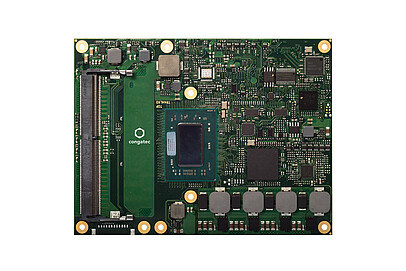conga-TR4
conga-TR4
COM Express basic type 6 module by congatec
Congatec's conga-TR4 high-performance module with COM Express Type 6 pinout is based on the latest AMD Ryzen™ Embedded V1000 multi-core processors. These modules reaching up to 3.75 GHz, offer up to 52 per cent more processor performance.
Description
Thanks to symmetrical multiprocessing, they also provide particularly high parallel processing performance. They support up to 32GB fast and energy-efficient dual-channel DDR4 memory with up to 3200 MT/s and optional ECC for maximum data security.
The new integrated AMD Radeon™ Vega graphics with up to 11 compute units supports up to four independent displays with up to 4k UHD resolution and 10-bit HDR, as well as OpenGL 4.4 for 3D graphics and DirectX 12 . The integrated video engine enables hardware-accelerated streaming of HEVC (H.265) video in both directions. Thanks to HSA and OpenCL 2.0 support, deep learning workloads can be assigned to the GPU. In safety-critical applications, the integrated AMD Secure Processor helps with hardware-accelerated encryption and decryption of AES, SHA and RSA.
The conga-TR4 is also the first congatec COM Express Type 6 module to allow a complete USB-C implementation on the carrier board including DisplayPort 1.4, Power Delivery and USB 3.1 Gen 2 with 10 Gbit/s, for example to connect external touchscreens with a single cable. Further performance-oriented interfaces offered, includes 1x PEG 3.0 x8, 4x PCIe Gen 2 and 4x PCIe Gen 3, 1x Gbit Ethernet, 3x USB 3.1 Gen 2, 2x SATA Gen 3, 1x USB 3.1 Gen 1, 8x USB 2.0. I/Os for LPC, SD, SPI, I²C as well as 2x legacy UART from the CPU and High Definition Audio round off the range of interfaces.
The supported operating systems include Linux, Yocto 2.0 and Microsoft Windows 10, or optionally Windows 7. congatec provides an extensive range of passive and active cooling solutions for workstation designs up to 54W performance, application-ready carrier boards as well as best practice carrier board layouts and circuit diagrams, e.g. for USB-C implementations, to help simplify the design-in of the modules.

